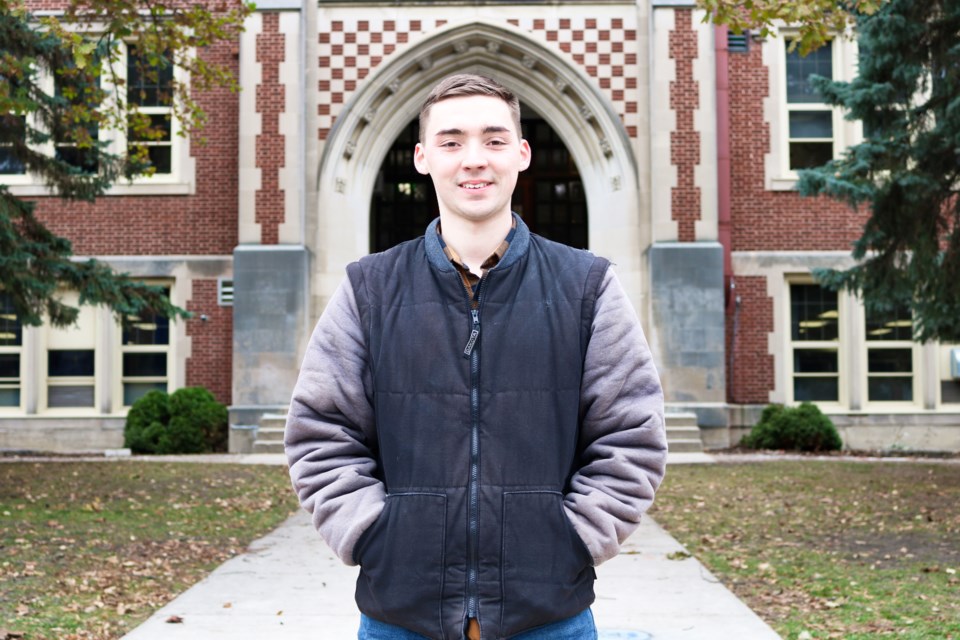A long-time local mental health advocate is now turning his attention to helping kids in care pursue education.
Noah Irvine became a fierce mental health advocate after losing his mom to suicide when he was five, and his dad to mental illness and addiction when he was 15, writing letters to MPs, speaking with Prime Minister Justin Trudeau and winning a national award for his suicide prevention efforts.
In 2021, he wrote a book about his life and efforts, donating the proceeds to a scholarship at his former high school he created for students who have lost a parental figure and are pursuing further education.
Now, he’s pushing the University of Guelph to make more of an effort when it comes to helping former Crown wards – children of the provincial government who have been removed from their families – pursue post-secondary education.
Irvine paints a picture of the difficulties Crown wards face when it comes to education.
“You’ve got about a 40 some odd per cent high school graduate rate nationally. You have a five per cent post-secondary attendance rate in the country,” he said, adding that these numbers are “horrific” and “unacceptable for 2023.”
Irvine recently spoke at two keynote events for Family and Children's Services Guelph-Wellington, both with a focus on educational outcomes for children in care. At both these events, he said representatives from several post-secondary institutions were in attendance, but not the U of G.
U of G News Service Officer Angela Mulholland said the university did not receive an invitation to either event, and that its members are active contributors "to the broader Guelph community and appreciates opportunities to engage in local initiatives and events."
But Irvine was disheartened they weren't there.
“These are children who society has failed substantially, and who deserve better," he said.
In response, he wrote letters to U of G President Charlotte Yates, Director of Student Wellness Services Alison Burnett and interim vice-provost Irene Thompson.
“I should not be on this campus today,” the letter reads. “Statistics would have you and others believe that I should be dead, addicted, in jail or have given up on life. Yet, I am here.”
But he is the minority, he writes.
“If the university believes in wellness and in improving life, these are the young people who deserve the most help and support. They did not choose the lives they were given. It is imperative for all of us to show them that their lives cannot only improve but that they can flourish in life,” the letter reads.
“As somebody who is about as close as you can get to being in the system, it’s very disheartening when I see post-secondary institutions brushing these kids off, because I don’t think we can anymore,” he said, adding that a substantial amount of these kids end up in the court system, and education can change that.
“With a graduation rate below 50 per cent, I think that all post-secondary institutions have to take a leading role in trying to improve these numbers.”
Irvine himself is a student at the university, and in 2021 was awarded the Summerlee Humanitarian Scholarship for the work he does around mental health and addictions in the community.
“I think what I'm doing with these letters is exactly what that scholarship encourages. It is exactly what the University of Guelph encourages,” he said.
Irvine is hoping Yates, Burnett and Thompson will be moved to take action after receiving the letters.
“I’m hoping the school shows up to (CAS) events, first and foremost,” he said.
He’s also hoping they will take a similar approach to other universities like Wilfrid Laurier “which provide substantial financial support” to the former kids in care who apply to their institutions.
The U of G offers "integrated our support for Crown wards into the full range of peer support programs at U of G," Mulholland said, with the main peer program running out of student experience, and others through "a number of faculties and academic programs and departments."
“Through our Peer Helper network, student volunteers committed to providing valuable assistance to their peers offer guidance and connect them with on-campus and community services," she said.
Mulholland also added they have "many financial aid programs to support students with the costs associated with their studies here,” as well as two bursaries that together total $6,000 and help two students each year.
"Crown wards are also eligible for many other additional scholarships and programs specific to students with demonstrated financial need or those who are first-generation students: Bursaries, work study, summer research assistantships," she said.
Still, he said other institutions are doing it better, pointing to a program at Laurier, which helps to remove financial barriers, expand opportunities to correct with faculty and peer mentors, and provides a campus contact to guide and support students through post-secondary, the program page states. They also offer emergency funding and a bursary for up to 20 students.
“The basic point to my letters is, if you are going to say that you believe in student wellness, if you are going to say that you seek to improve life, these are kids who deserve better lives, and you’re not showing up for them.”
“If we believe in improving life, then we have to show up. We cannot ignore these young people who have the capacity to do great things.”
